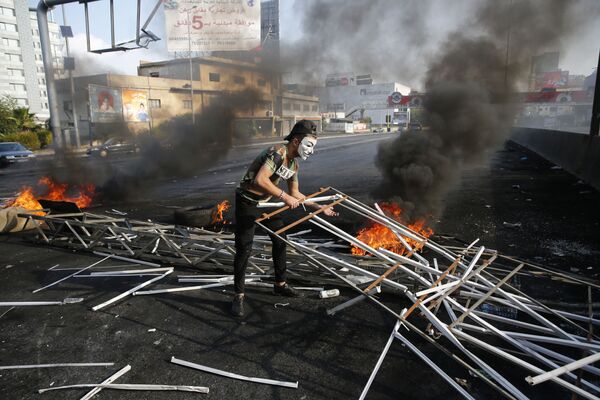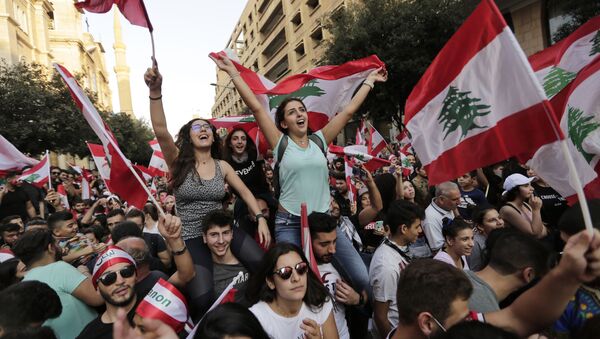The Lebanese mass street protests also dubbed the Tax Intifada and the Whatsapp Revolution have quickly morphed into an anti-government movement: on Friday, demonstrators rejected President Michel Aoun's call for dialogue and urged him to step down.
The turmoil erupted on 17 October over new taxes included in the draft 2020 state budget aimed at reducing the deficit and boosting revenues. In particular, the government proposed introducing a $6 monthly tax on online calls via Whatsapp and other messengers. The public discontent also coincided with a series of wildfires which broke out on 13 October and quickly spread over large areas of Lebanon's forests.
Tens of thousands took to the streets in various regions of Lebanon, prompting the government to revoke the proposed bill as the protests turned violent.
On 20 October, Prime Minister Saad Hariri presented a package of economic reforms to calm the situation down and resolve the crisis. However, the protesters rejected concessions and blocked key roads in response.
On Thursday, Lebanese President Michel Aoun addressed the nation signalling his readiness to meet with protesters' representatives, but again the government proposal fell on deaf ears.
'People are No Longer Asking for Minor Reforms'
Ghassan Kadi, a Middle Eastern expert, blogger and political analyst of Syrian descent, explains that "unlike previous Lebanese street protests which were politically or ideologically driven, these are protests of angry and hungry people".
According to him, Prime Minister Hariri and President Aoun failed to smooth things out because their concessions "came too late and offered too little".
"People are no longer simply asking for minor reforms; they are asking for corrupt politicians to be held accountable, for their foreign account funds to be repatriated, for their property to be confiscated and [for them] to face court", Kadi elaborates. "Ironically, the Lebanese Parliament has passed a bill to establish a 'national anti-corruption council' two months ago. President Aoun refused to ratify it and sent it back to Parliament for amendments. Now, in light of the protests, he is calling for the establishment of a council to fight corruption".
The analyst highlights that Lebanon is a country "rich in many resources, many rivers and untapped natural gas to name a few," while its "human resources have been the backbone of development of the Gulf region" – and yet, Lebanese youths cannot find local jobs.
The Middle East expert lamented the fact that "successive governments [in Beirut] have not been willing and able to rebuild the infrastructure, destroyed during the 1975-1989 civil war".
"There are shortages of water, power, employment opportunities, all the while politicians are filling their coffers with corruption money and hiding it in secret Swiss bank accounts", he underscores.
The political analyst notes that foreign minister Gibran Bassil, Aoun's son-in-law, has become the main target of the demonstrators who accuse him of corruption.
"Aoun, a former army chief, embarked on a career of reform and used the slogan 'reform and change' for his political party", the political analyst recalls. "Perhaps he was genuine, but by the time he came to power in 2016, he was already in his eighties and unhealthy. He informally passed on the reigns of governance to his son-in-law Gibran Bassil, who proved to be highly corrupt and inept. He is believed to have stolen billions of dollars and lavished himself and family with costly holidays under the guise of official trips".

'External Players May Capitalise on the Protests'
The protests have engulfed both the south and the north of the country, bringing together Muslims, Christians and the Druze. And still, the question arises as to whether any external players are fanning the rage.
According to Kadi, "thus far, the protests look spontaneous and without direct and obvious external interference".
Still, judging from the eagerness with which international mainstream media jumped at covering the protests and their support for the uprising, there is a chance that "some meddlers [are] trying to capitalise on the phenomenon", the Middle East expert opines.
Kadi refers to the timing of the unrest and Aoun's longstanding ties with Hezbollah, an Islamic militant organisation that took an active part in the 8-year civil war in Syria.
"Given Hezbollah's recent victory in Syria, I would not be surprised if the protests would eventually be used as a weapon to weaken the current strong political position of Lebanon", he highlights.
In a 19 October televised speech, Lebanon's Hezbollah leader Sayyed Hassan Nasrallah openly condemned new taxes and at the same time made it clear that he did not want the government to resign. His statement prompted criticism from some of the demonstrators.
"Nasrallah has recently endorsed the protests, but in the eyes of many, his words are also seen to come from the too-little-too-late basket", Kadi says, adding that some forces could jump at the opportunity to sway public opinion against the militant group "for giving its political ally Aoun cover".
Still, he believes that the uprising won't turn into yet another civil war in the region, especially given the fact that the Lebanese army is monitoring the situation and "keeping elements of chaos out".
"Unless the uprising changes course, unless meddlers can derail it, I cannot see how this can morph into a civil war akin to that of 1975. If anything, thus far, the protests look like the revolution Lebanon needs to have; one that is peaceful and demands reform", the political analyst underscores.


